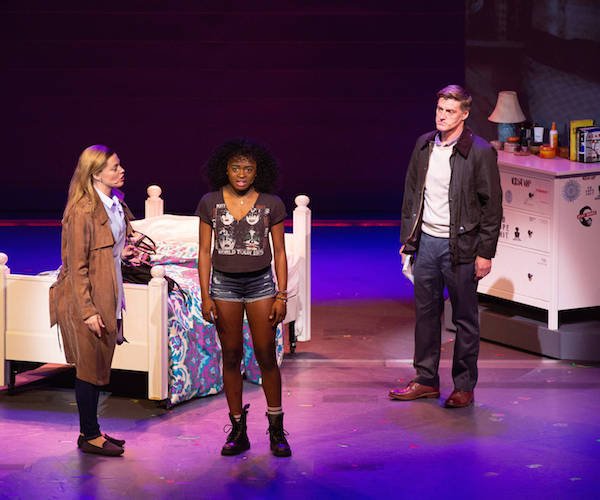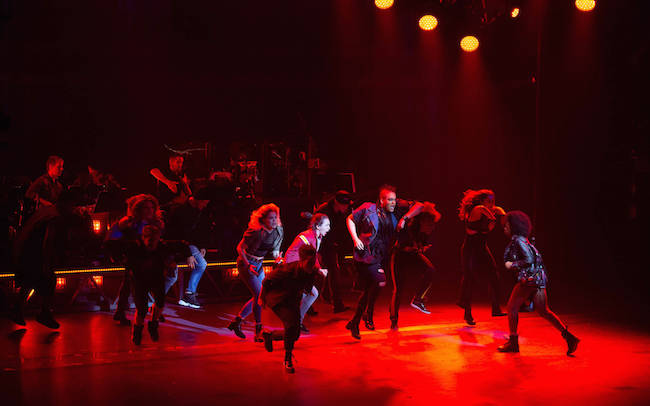Theater Review: “Jagged Little Pill” — A Relevant and Rocking Brew
In the end, Jagged Little Pill manages to spotlight multiple modern problems while making us care about its characters.
Jagged Little Pill. Music by Alanis Morisette and Glen Ballard, lyrics by Alanis Morissette. Additional music by Michael Farrell and Guy Sigsworth. Book by Diablo Cody. Directed by Diane Paulus. Music supervised, orchestrated, and arranged by Tom Kitt. Choreography by Sidi Larbi Cherkaoui. Produced by the American Repertory Theater, Loeb Drama Center, 64 Brattle Street, Cambridge, MA, through July 15.

Elizabeth Stanley (Mary Jane), Celia Gooding (Frankie), and Sean Allan Krill (Steve), in the A.R.T.’s production of “Jagged Little Pill.” Photo: Evgenia Eliseeva.
By Evelyn Rosenthal
How do you turn the raw, alt-rock sound of Alanis Morissette’s monster-selling 1995 album Jagged Little Pill into a musical? A.R.T. artistic director Diane Paulus apparently made all the right moves, for she and her team have put together a witty, moving show with more than a few electrifying moments.
Reversing the process of 2015’s Waitress, when she hired pop star Sara Bareilles to create music and lyrics for an adapation of Adrienne Shelley’s 2007 film, this time Paulus faced the trickier task of constructing a compelling story around an existing—and quite famous—set of pop songs. Though the album contains no readymade plot, the book by Diablo Cody (Academy Award–winning screenwriter of Juno and the just-released Tully) echoes the tone of Morissette’s rocking stew of youthful anger, pain, and urgent searching for connection, identity, authenticity, justice.
The setting is right here, right now, and the characters and plot points couldn’t be more of the moment. Mary Jane Healy is a suburban mother of two high schoolers, whose manic perfectionism is a rapidly fraying cover for her secret opiate addiction. Steve, the mostly absent husband and father, is a workaholic (except for the hours he spends on internet porn sites), and the couple haven’t had sex in a year. Son Nick is an overachieving people-pleaser who has just realized his (mother’s) dream of getting into a fictional version of Harvard. And Frankie, the family’s adopted black daughter, is dealing with a host of issues, including the sense of not belonging in her white family (was her adoption a narcissistic “rescue” mission?) and feeling that no one gets her—especially her mother. The one person who definitely does is her gender-questioning best friend Jo, with whom she is beginning to get romantic.
If all this sounds like a checklist of hot issues—well, it is, a little. A date-rape plot point adds to the ripped-from-the headlines effect. What makes the show work as well as it does, though, is everything else: the stellar acting and singing by the perfectly cast players; Cody’s sharp, comic writing; eye-popping visuals by scenic, lighting, and video designers Riccardo Hernandez, Justin Townsend, and Finn Ross; Sidi Larbi Charkaoui’s kinetic choreography; and more than 21 incisive songs written or cowritten by Morissette and deftly arranged and orchestrated by music supervisor Tom Kitt, the Tony Award–winning composer of Next to Normal.

Jo (Lauren Patten) and the chorus confront Frankie (Celia Gooding) in the number “You Oughta Know.” Photo: Evgenia Eliseeva.
Elizabeth Stanley gives a dynamic performance as the tightly wound Mary Jane, aptly described as “one salad away from a psychotic break.” Sean Allan Krill as Steve brings a tender earnestness to his scenes, especially in the duet “So Unsexy,” where he bares his pain at the emotional distance between the couple. The number is a perfect distillation of their relationship, though it might have been even more effective without the chorus chiming in at the end.
Ah—the chorus. A talented ensemble functions quite obviously as a Greek chorus, adding their two cents to almost every number. The device often works, but in some cases the presence of so many bodies and voices distracts from the focal characters and actually dilutes the emotional impact. Perhaps as the show develops toward its inevitable—and deserved—Broadway run, the chorus will be more judiciously deployed. That might also help reduce the temptation to amp up the proceedings; the current production suffers from a few too many blindingly lit, earsplittingly loud numbers.
Eighteen-year-old Celia Gooding plays Frankie with an appealing coltishness, conveying the character’s mixture of rebellion, searching, and self-doubt. It’s Frankie we’re meant to identify with; Cody borrows the name of the central character of Carson McCullers’s Member of the Wedding, another tomboyish girl working out her place in her family, and gives this Frankie her own profession. In a hilarious scene, the aspiring writer reads to her creative writing class her latest “essay, poem, story-type thing”—which turns out to be Morissette’s biggest hit, “Ironic.” When fellow students tear down her work, accusing her—as Morissette was, by some critics—of misusing the word “ironic,” a male student named Phoenix jumps up to defend her. Antonio Cipriano shines as the sensitive loner who becomes Frankie’s friend, and then something more.
But while Frankie’s arc is the heart of the show, its soul belongs to Jo (another literary nod, to Alcott’s independent-minded writer heroine?). As vulnerable as she is tough, Jo embodies the passions of Morissette’s music and lyrics. Lauren Patten is absolutely riveting whenever she’s on stage—which, thankfully, is often. She stopped the show for an extended standing ovation with her guts-out take on “You Oughta Know,” a furious, sarcastic cry of rejected love. Arms tight at her side, fists clenched, she owned the song, and to a great degree, the show.
Another ingenious set piece stands out: Mary Jane goes out to search for her fix, first at a pharmacy (no prescription, no luck), and then meets a hoodied connection in an alley behind (yes, ironically) the local Soul Cycle where she goes to exercise. Sufficiently high now, she wafts through her grocery shopping to the song “Smiling” until suddenly the tape begins to rewind and each scene repeats in reverse back to the moment before she left the house. It’s a beautifully choreographed and executed sequence that underscores her unraveling.
In the end, Jagged Little Pill manages to spotlight multiple modern problems while making us care about these characters. Though the problems resolve a little too patly, Cody, Paulus, and their team deserve credit for creating an immersive musical that brings out the pulsing humanity of Morissette’s songs. With so much going for it, the show is well worth experiencing—and with so much going on in it, you may even want to see it twice.
Evelyn Rosenthal is a singer specializing in jazz and Brazilian music, a freelance editor, and the former editor in chief and head of publications at the Harvard Art Museums. She writes about musical theater and music for the Arts Fuse.
Tagged: American Repertory Theater, Diane Paulus, Jagged Little Pill

Thanks, Evelyn Rosenthal, for this judicious and informative review, especially valuable given the buzz and publicity vaunting this show as the next Great (your adjective here) Hope of the American Musical.
I just saw the show a second time and I have not done that with a show since seeing the original Hair! I disagree with your comment about too many blindingly lit and loud numbers though! They just add to the shows honest and authentic feel of the world we live in today!!!!! We are constantly being blindingly and loudedly assaulted with horrifying information. I recommend running to A.R.T. before they sell out. This show is brilliant in every way!!!!